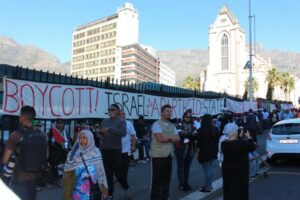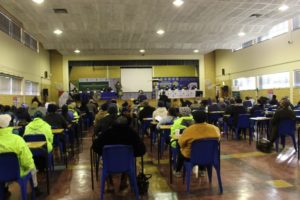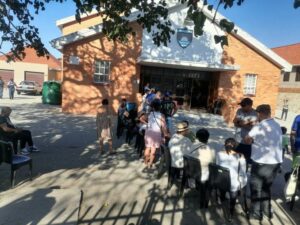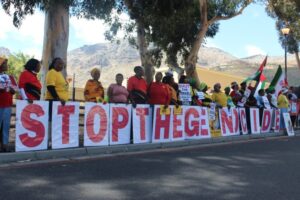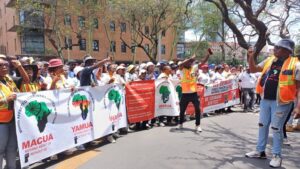Residents of Thandanani informal settlement in Greenwood Park, Durban, are blaming eThekwini Fire Department for the slow response to the fire that burnt over 100 shacks to ashes on Saturday night. One person was injured in the fire.
When emergency personnel arrived at the scene, they didn’t have enough water to extinguish the fire because, the city says, residents had a hand in the wastage of water. According to eThekwini spokesperson, Msawakhe Mayisela, the city was made aware of the fire and immediately responded with three fire trucks, two water tankers and an incident commander.
“Our teams came from Durban North, uMhlanga and Ntuzuma and had reached the incident at different times. All vehicles that responded had water. Upon our arrival, multiple dwellings were alight (end estimate was around 120). We attempted to stop the fire from spreading, however, we were hindered by the crowd who did not allow firefighters to do their work. People were screaming and shouting at our crews. Pulling away the fire hoses to extinguish their own dwellings, making threats at our crews. This led to our available water being wasted and not being used to stop fire spread,” said Mayisela.
He said one of the station commanders was assaulted, sustaining injuries to his back and shoulder. “Family and friends of the settlement were attempting to drive into the only access road that fire trucks could use. Our tanker was delayed in getting out to replenish at the hydran when required to. In spite of the threats to the brigade we did not retract from the incident. Our crews worked aggressively to bring the fire under control and extinguish the fire. It was a hour-hour job on a steep slope,” Mayisela said.
He said it is not for the first time that their crews have been attacked when responding to such emergencies. “This is a very worrying phenomena which if it continues unabated will result to our members getting reluctant to respond to emergencies in these communities. We are therefore humbly appealing to members of the community to protect our emergency personnel and refrain from interfering with their operations because this could result in injury and even loss of life,” Mayisela said.
In the meantime, fire victims are being housed at a community hall until they can rebuild. This is the third fire in the area this year. Residents say the municipality should come up with a plan to prevent further incidents in informal settlements. A resident who spoke to Elitsha on condition of anonymity for fear of intimidation said they believe the fire was intentional. “There have been some issues here which I believe are politically related and I think this was intentional because we could smell petrol from where the fire began. What I don’t understand is why burn people’s shacks leaving so many people destitute. There are women and small children who have been affected, they have lost everything and most people don’t even work so how are they going to rebuild?” she asked.
Another resident, Veronica Mabhulule said she lost everything in the fire and she doesn’t know where to begin while Patrick Ndebele said the city must come up with plans to train people living in informal settlements on how to fight fire. “The problem is that due to overcrowding, the fire spreads quickly and most people don’t know what to do. If all informal settlements have trained people on extinguishing fires maybe it will make a difference and they will know what to do to prevent a fire from spreading,” said Ndebele.
He admits that people panic when there is a fire and everyone wants to save his or her own shack which sometimes interferes with what the firefighters are doing. “If we have trained people we won’t have this problem. People use water buckets to try and douse the fire and most of the time it doesn’t help anything but it is worth a try than to just stand there and watch your home being gutted by fire,” Ndebele said.
eThekwini Disaster Management and relief organisations have been called in to assist the affected residents. Ndodeni Dengo, KZN coordinator of the Slum/Shack Dwellers International said overcrowding at informal settlements is a major concern and they are looking at introducing reblocking to mitigate the spread of fires. He said residents are reluctant as it requires a lot of spacing but they are negotiating as this will save live.
Reblocking is when a shack settlement is rearranged in clusters instead of the improvised order that occurs as a settlement grows. Reblocking allows for each cluster to have shacks facing each other, forming a common courtyard for the cluster with a single entrance. “It is not going to be easy as most people have more than one shack and with reblocking it is going to take up most of the space but we are in talks with residents so that we can get started as soon as the material arrives,” said Dengo.
